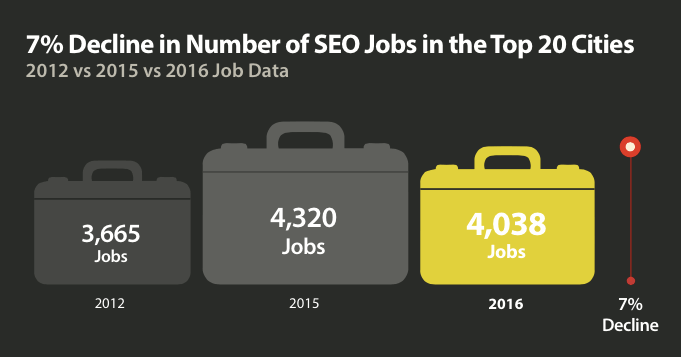SEO Jobs and Salaries Go Down in 2016 – Why?
 Search Engine Journal has an article about SEO jobs being on the decline. Following is an excerpt from that article:
Search Engine Journal has an article about SEO jobs being on the decline. Following is an excerpt from that article:
Looking at the top 20 cities in the US, there is a 7% overall decline in SEO jobs when comparing year over year data. Job salaries took a hit as well; the average salary decline was 6%, with SEO Coordinator seeing the sharpest decline at 19%.
Less SEO jobs. Salaries for SEO are going down, up to 19%. Why is this? My opinion differs from that of those quoted in the article.
Esther Chung of Conductor (the place that compiled the lower stats on SEO employees), says:
the decline in inbound marketing jobs and salaries actually means that SEO is on the rise. Instead of existing as a siloed function, SEO is expanding into a common skill universally featured among different roles.
In other words, everyone does SEO now, it’s not a specific job anymore – it’s a part of everone’s skill set, and as such there are less specific jobs for it.
Rand Fishkin opines as thus:
Rand Fishkin of Moz quoted in the study, essentially agreeing with it. He says SEO is becoming less of a job title and more of a general requirement.
 My opinion is quite different. Starting in 2012, Google went on the offensive against SEOs. Through many punitive algorithm changes, including Panda and Penguin, more and more SEOs have become ineffective. It’s simply quite a difficult thing today, to provide consistent ranking improvements.
My opinion is quite different. Starting in 2012, Google went on the offensive against SEOs. Through many punitive algorithm changes, including Panda and Penguin, more and more SEOs have become ineffective. It’s simply quite a difficult thing today, to provide consistent ranking improvements.
What are you to do, if you are a company which relies on search engines for sales, if Google starts penalizing your website and offering less traffic? The initial reaction would be that you double down and try harder. This accounts for the “jobs soaring” over the past four years, since Google’s major punitive algorithms started to be released.
There comes a time, however, when you have to cut your losses, pick up your marbles and go home. Over the past four years, many SEOs have floundered rankings, unable to use the old link building practices to achieve sustained rankings. With the advent of negative SEO, many online companies have suffered in rankings with it being no fault of their SEO employees – yet properly diagnosing that is something that rarely happens.
 It’s a new algorithm change, or it’s someone performing negative SEO, or it’s (fill in the blank), there comes a point where excuses no longer matter. All that matters is that online business is down, and hiring more SEO employees doesn’t rectify the situation. The stark situation has companies go out of business, or they adapt. They adapt by working on other prospects and phasing out the profits they expected or required from SEO generated profits.
It’s a new algorithm change, or it’s someone performing negative SEO, or it’s (fill in the blank), there comes a point where excuses no longer matter. All that matters is that online business is down, and hiring more SEO employees doesn’t rectify the situation. The stark situation has companies go out of business, or they adapt. They adapt by working on other prospects and phasing out the profits they expected or required from SEO generated profits.
The same goes for companies which offer SEO services. Most companies which relied on push-button software to achieve rankings are now out of business, unable to provide rankings to their clients. Obviously, if the industry isn’t flourishing – they’re not going to be hiring. It’s for these reasons that jobs and salaries for SEO employees are going down.
Fortunately, if you’re good at SEO, you’ll always be able to provide for yourself. Why find a job working for a company as a SEO, when you can make money by operating your own websites and doing SEO for them? This assumes, of course, that you know what you’re doing.
That’s what it boils down to. If your salary is $60,000 as a SEO, you should be able to generate at least $60,000 per year worth of extra business for the company you represent, right? If that’s not the case, why are they hiring SEOs for in the first place? That’s precisely the problem.
 Every good SEO should know how to make money by operating their own sites. If your end goal is to actually work for another company, it still is a good idea to know how to do it for yourself – whether as a backup plan, or simply to sharpen your skills so you know what you’re doing for your employer.
Every good SEO should know how to make money by operating their own sites. If your end goal is to actually work for another company, it still is a good idea to know how to do it for yourself – whether as a backup plan, or simply to sharpen your skills so you know what you’re doing for your employer.
Needless to say, SEO is alive and kicking in 2016 and beyond, and it is entirely possible to make a career out of ranking websites in Google. If the worst case scenario is that you do it strictly for yourself, that’s not so bad right? Unless – you don’t know what you’re doing and you can’t rank pages in Google.
If that’s the case, you would be better to experiment solo for a while, in order to build your skills up, in the first place. Consider your personal websites, which you SEO, as a portfolio. If you can rank them, it’s obvious proof that you know what you’re doing. This works great for proving that you’re able to rank pages during a job interview. If you’re unable to actually land a job, work harder at your own sites. You may find that someday, you’re no longer interested in finding a SEO job – because you do far better on your own.

Comments